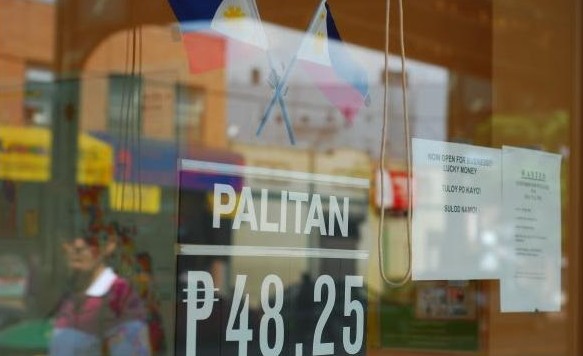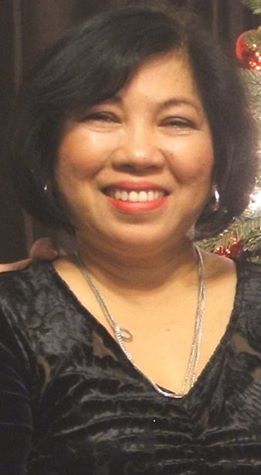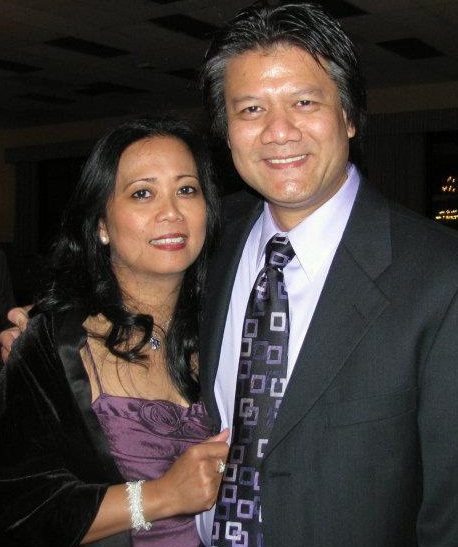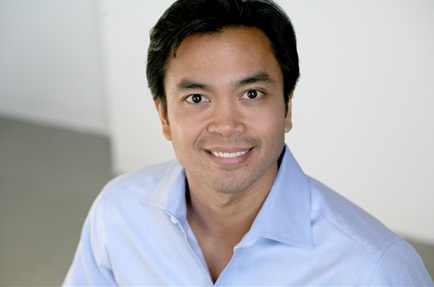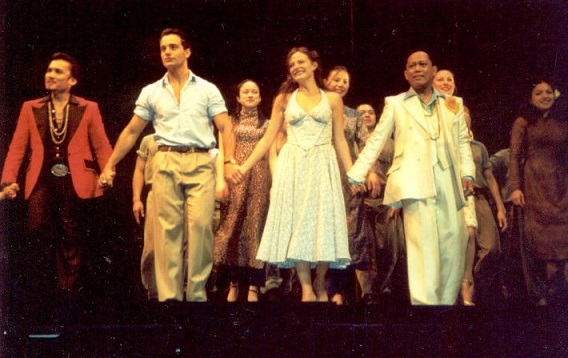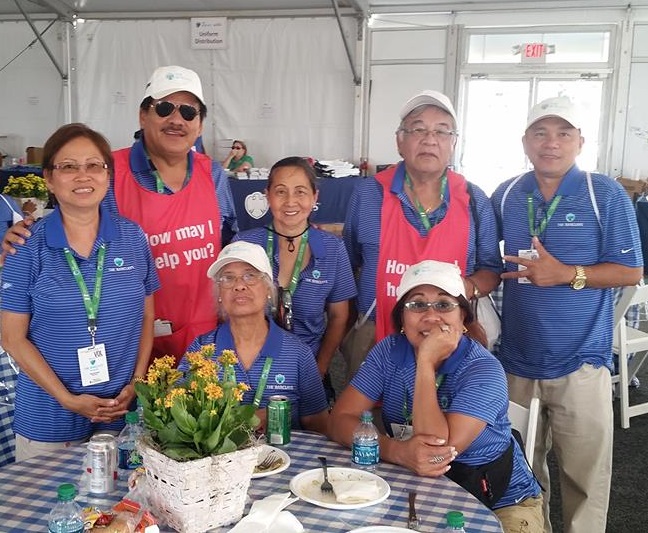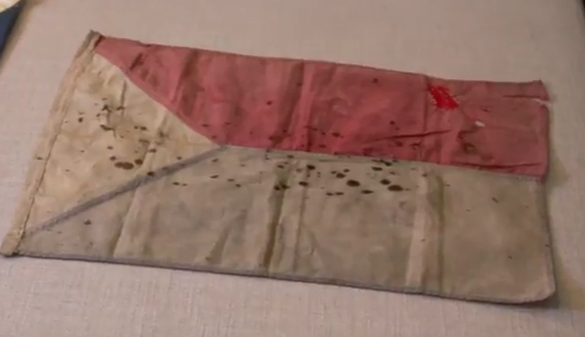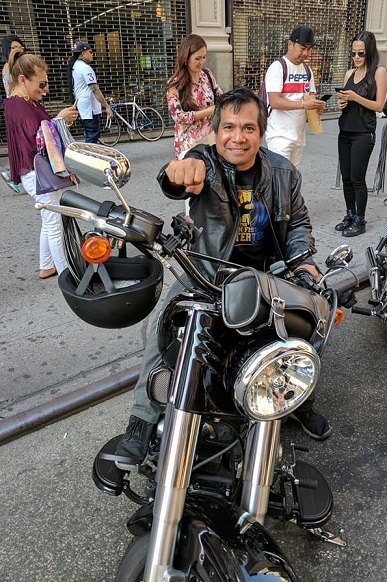With Trump set to meet Duterte, FilAms examine ‘war on drugs’
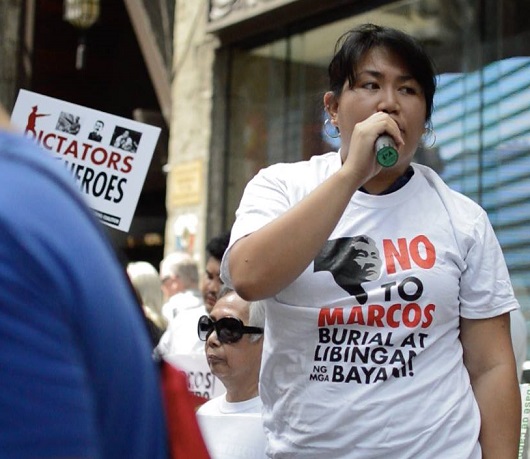
Nina Macapinlac at ‘Marcos is No Hero’ rally outside the Philippine Consulate building on Fifth Avenue. Facebook photo
Early this year a group of progressive Filipino Americans angry with the presidency of Donald Trump announced a campaign called “Unite Against Fascism.” But this past September they expanded the campaign to include the president of their homeland, Rodrigo Duterte.
Many FilAms, like other immigrant groups, feel under siege by the policies of the Trump Administration. They say they are condemning both leaders for their “anti-people policies,” especially Duterte’s war on drugs, which has left more than 13,000 dead, according to government figures.
Last April, Trump commended Duterte’s actions in a phone call, according to a transcript leaked by The Washington Post and The Intercept. Trump is scheduled to visit the Philippines this week.
Bayan-USA coordinator, Nina Macapinlac, said Trump is supporting Duterte’s war on drugs by providing millions of dollars in military aid.
“As Bayan, we want to build power among our communities here because Filipinos overseas are still part of the Filipino nation,” Macapinlac said in an interview with The FilAm. “We try to organize locally, raise awareness of what’s going on and educate people on why they should oppose this dictator.”
Bayan-USA is an alliance of 20 progressive Filipino groups across the U.S., but there are only four active chapters in the New York area, representing students, women, workers and human rights activists.
The organization is also discussing ways to pressure the U.S. government to change policy. There is a law that prohibits the U.S. government from supporting armed forces or any governments that have a track record of violating human rights, Macapinlac said. The U.S. government is currently providing military aid despite the U.N.’s criticism of Duterte’s anti-drug policies.
Lean Deleon, 28, another Bayan-USA member, said that he lost his second cousin to Duterte’s drug war less than a year ago. According to Deleon, his cousin, Moises Cabildo, was eating outside of his house when six unidentified men on motorcycles gunned him down in broad daylight. He died in his mother’s arms. A month prior, Cabildo had surrendered his name to the government as a former drug addict for amnesty.
“I think the U.S. campaign is really about raising awareness and creating solidarity, particularly among Filipino Americans, because a lot of them still support Duterte,” Deleon said.
Despite international scrutiny, Duterte’s War on Drugs is widely supported in the Philippines. The issue has polarized the Filipino community in the U.S.
Ernie Pamolarco, a public school teacher in New York City, is the chairman of a New York-based group called Die Hard Duterte Supporters. There are approximately 100 members in New York.
Pamolarco last visited the Philippines one year ago, and he said the streets there are safer at night and crime and corruption are noticeably decreased.
“Peace-loving Filipinos like it,” Pamolarco said. “Who doesn’t want to live in peace? Obey the law. Don’t do crimes. Don’t do drugs. That’s it. It’s very simple if we follow the law.”
To the opposition, however, the solution is not that simple. Bayan-USA acknowledges there is a drug problem with nearly 3 million drug addicts in the country, but according to Macapinlac, the root of the drug problem lies in poverty, unemployment and a lack of social services.
“You can’t blame Duterte as an individual for everything. He’s the figurehead of a truly rotten system,” Macapinlac said, “but he’s not solving the problem. He’s just killing us.”
The effects of the drug war impact overseas workers in the United States, Deleon said. Many have lost loved ones. He told about a Filipino working as domestic worker in New York who had to beg her American employer, kissing his feet, to allow her to go back to the Philippines for her son’s funeral.
For activists in the U.S., it sometimes feels disheartening to see the death toll rise while public support remains high.
“For me, sometimes we don’t even expect to have an impact, but I think it’s still important to reach out to who you can,” said Carlos Santos.
Growing up in the slums, Santos found protection from school bullies by befriending the neighborhood drug dealers. By the age of 14, Santos was a drug addict. Nearly 20 years later, he left for the United States to get clean for his newborn daughter, who is still in the Philippines with her mother. Now, as a member of a NY-based Filipino activism group, Santos campaigns on Manhattan streets as one childhood friend after another is murdered back home.
“I’m in a band and we always write songs about the war on drugs to make people here think about it,” Santos said.
“There’s a good minority of us against the war on drugs, but we’re the underdogs right now,” Santos said.
Approximately 80 percent of Filipinos were in favor of Duterte earlier this year, according to the Social Weather Stations survey. This Manila-based quarterly survey showed a decline in public support in October, but more than half of the Filipino population remains in favor of the president.
“I can’t blame them,” Santos said. “How can you blame them if they think the only way to change the Philippines is by killing the bad people they think destroyed the country?”
The only reason Santos got clean is because his family didn’t give up on him, however. He said he asked his mom not to give up on him, but to give him a chance to start fresh instead. So she begged his uncle, who was living in the U.S., to come and take him away from the Philippines.
“There are kids who are being killed, but they have a future,” Santos said. “Look at me. What I’m trying to say is you can get out. It’s possible to get out.”
A couple months ago, Santos received word that his childhood friend had been murdered outside of his home with his two young children inside. The last time Santos had talked to him, the friend was trying to find good ways to put food on the table.
“I’m here in the U.S. trying to get people to realize that this is not a war on drugs. This is a war on the poor people,” Santos said.
Santos’s mom warned him not to come to the Philippines. It’s too dangerous, she said. There are people looking for him.
“The Philippines is home,” Santos said. “My whole family is there. My daughter is there, and she needs me. I’m still going to go back and if I get killed, then so be it.”
© 2017 The FilAm

